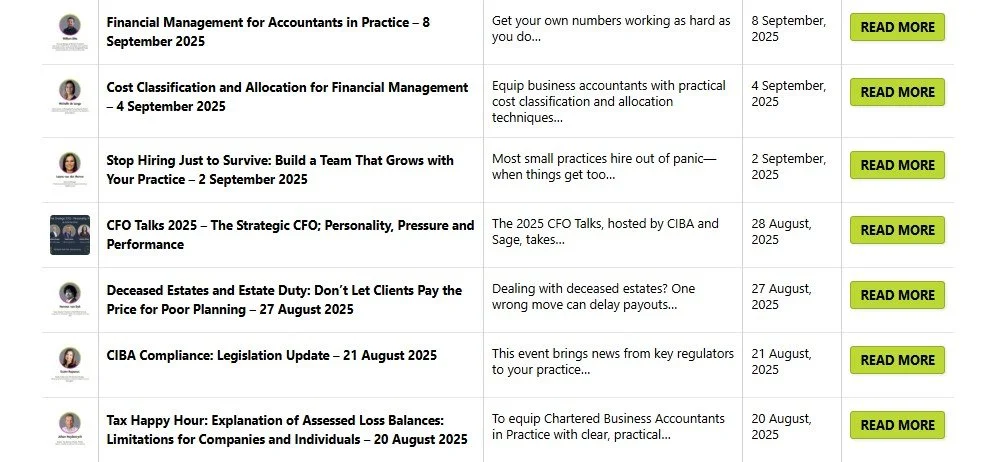Subpoena Shock: What Every Accountant Needs to Know
This article will count 0.25 units (15 minutes) of unverifiable CPD. Remember to log these units under your membership profile.
It doesn’t arrive in a neat envelope. More often, it’s a court-stamped document titled “Subpoena Duces Tecum,” handed to you — in person — by the sheriff of the High Court, usually in plain clothes. That detail matters: a subpoena cannot be emailed, and it cannot be handed over by just anyone. If it doesn’t come through the sheriff, it’s not properly served.
What is a Subpoena?
When it does land on your desk, it can derail an entire week. Because a subpoena duces tecum isn’t a polite request. It’s a court order. And suddenly, you’re juggling more than compliance deadlines, you’re balancing legal duties, client trust, and the terrifying thought that non-compliance could mean fines, jail time, or reputational damage no marketing budget can repair.
A subpoena duces tecum is Latin for “bring with you.” It compels you to produce client-related records in your possession, as specifically set out in the court order. Unlike a standard subpoena, which requires in-person testimony, this one demands documentation, but the scope is not for you to guess. The subpoena itself spells out exactly what must be delivered. Accountants often sit at the centre of financial disputes, fraud investigations, or divorce battles. So it’s no surprise that CBAPs, as custodians of their clients’ records, frequently find themselves on the receiving end.
Why It Matters for CBAPs
Imagine this: you’re running a small practice, keeping 20 SMEs compliant, when suddenly you’re required to hand over your client’s records because the court demands it. For a CBAP, this isn’t just about legal compliance. It’s about:
Time lost: billable hours vanish into subpoena compliance.
Client trust: they may not understand why their records are in court.
Reputation: a mishandled subpoena can brand you as careless or unprofessional.
“When I got served, my client thought I had done something wrong. I spent days calming them down and explaining it was the court’s process. Meanwhile, my deadlines piled up.”
First Moves When You’re Served
The difference between chaos and control lies in the first 48 hours:
Check that it’s valid — must be court-stamped and personally served by the sheriff.
Call your lawyer — privilege, confidentiality, and deadlines are complex.
Preserve documents — do not delete, shred, or “clean up.”
Mark the deadline — many subpoenas require delivery before the hearing.
Pause communication — don’t alert clients until legal advice is sought.
Your Rights Still Count
Subpoenas feel like absolute power, but South African law balances them with protections:
Privilege: You can resist disclosing attorney–client communications or other protected information.
Relevance: Courts won’t allow “fishing expeditions”, i.e. listing all communication, documents of your client. If you feel that this may be the case, you need to consult your lawyer.
Specificity: If the subpoena is vague, you’re not obliged to guess, rather consult your lawyer and ask for assistance.
Reasonable time: Courts recognise that retrieving, reviewing, and preparing client records takes time. Deadlines should be reasonable, i.e. 10 business days.
The Sting of Non-Compliance
Non-compliance carries serious consequences:
Fine: Up to R300 (plus criminal conviction).
Imprisonment: Up to three months for willful refusal.
Contempt of court: A reputational scar that can end careers.
Professional fallout: Clients and regulators may lose confidence.
For CBAPs already working in a competitive market, credibility is everything. A single misstep with client records can cost more than money, it can cost you legitimacy.
How to Stay Ready
The best time to think about subpoenas is before one arrives. Smart CBAPs prepare by:
Document policies: Have a clear internal process for subpoena response.
Retention systems: Keep client records secure, orderly, and easy to retrieve.
Staff training: Ensure your team knows what to do if a sheriff arrives.
Professional indemnity cover: Check whether it includes subpoena-related costs.
Legal networks: Build a relationship with a lawyer who understands accounting practice realities.
Preparedness is not paranoia. It’s practice protection.
Final Word (and Disclaimer)
Being served with a subpoena duces tecum doesn’t mean you’ve done something wrong. It means the court needs evidence — and you happen to hold it on behalf of your client. Handled properly, you’ll comply, protect your clients, and move forward. Handled poorly, the consequences ripple through your business, your professional reputation, and your livelihood.
⚠️ Disclaimer: This article is for general guidance only and does not constitute legal advice. Always consult a qualified legal practitioner if you receive a subpoena.








